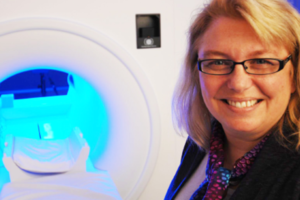Deanna M. Barch, an expert in cognitive and language deficits in psychological disorders, and Randall J. Bateman, MD, a leading Alzheimer's disease researcher, have been elected to the National Academy of Medicine, a part of the National Academy of Sciences.
Membership in the organization is extended to those who have demonstrated outstanding professional achievement and commitment to service and is considered one of the highest honors in the fields of health and medicine in the United States.
Barch is professor and chair of the Department of Psychological & Brain Sciences in Arts & Sciences and the Gregory B. Couch Professor of Psychiatry and professor of radiology at the School of Medicine.

Barch was recognized for her work helping to identify neural and psychological mechanisms that give rise to the symptoms of psychosis and other forms of mental illness that contribute significantly to disability.
"I am very honored to be elected, and want to thank all of those who have supported my work, including family, friends, colleagues and students," Barch said.
Barch's commitment to research can be seen in her prolific catalogue of peer reviewed research, which has earned her an h index of 105. Her commitment to service is apparent in her willingness to work with the media to responsibly explain what findings mean.
This was particularly evident this spring, when she spoke with St. Louis Public Radio about a study that looked at the prevalence of suicidal thoughts in children, finding suicidal ideation in pre-school children.
Her research found suicidal thoughts begin as early as 9 and 10 years old. Looking at data from nearly 12,000 9- and 10-year-old participants in the Adolescent Brain Cognitive Development (ABCD) study, a national longitudinal study on adolescent brain health in which caretakers also participate, the numbers were striking.
Researchers showed that from 2.4% to 6.2% of the children reported having suicidal thoughts, from wishing they were dead to devising - but not carrying out - a plan.
In her St. Louis Public Radio interview, Barch focused not just on the research findings, but on elucidating risk factors and giving adults a way to intervene, if they had suspicions.
Earlier this year, Barch was an author on a study that found women in the psychological sciences had made some advances, but the fields still had a ways to go when it came to gender parity. Of note, the pay gap between men and women widened as faculty advanced through their careers.

Female faculty in psychological sciences survey present, chart future
Recently the National Institute on Drug Abuse awarded Barch and colleagues participating in the Adolescent Brain Cognitive Development (ABCD) study an additional $13.7 million to continue their research into adolescent brain development.
The team is using advanced brain imaging techniques, structured interviews and behavioral testing to tease out how life experiences, along with a child's changing biology, affect brain development.
The National Academy of Medicine selected Bateman for his work in discovering the causes of Alzheimer's disease, developing the first highly specific blood test for Alzheimer's and initiating the first Alzheimer's prevention trial.

Bateman pioneered a technology that lets scientists monitor the brain's production and clearance of important proteins. This technique, known as stable isotope-labeling kinetics (SILK), was developed to measure the production and clearance of proteins that can cause Alzheimer's disease in people. Bateman's lab used SILK to demonstrate that clearance of amyloid beta is impaired in people with Alzheimer's disease, while people with rare mutations produce too much of the sticky amyloid-beta protein. Then, his lab demonstrated that amyloid-plaques are associated with increased tau production, the other protein of Alzheimer's disease production, linking amyloid and tau together to indicate how Alzheimer's may be caused. The technology also has helped scientists assess the effectiveness of experimental Alzheimer's treatments.
Bateman has been at the forefront of efforts to develop diagnostic tools for Alzheimer's disease. With colleagues, he developed a blood test for amyloid and a separate test for tau, another Alzheimer's protein. Both tests detect signs of the disease in people before symptoms arise. Once drugs are available to halt the disease process, having a simple blood test that identifies people on track to develop dementia while they are still mentally sharp would allow for early treatment that potentially could vastly reduce the burden of this very common and devastating disease.

Blood test is highly accurate at identifying Alzheimer's before symptoms arise
Bateman directs the Dominantly Inherited Alzheimer Network (DIAN), an international research partnership focused on understanding rare forms of Alzheimer's disease caused by gene mutations. People who inherit such mutations are all but guaranteed to develop Alzheimer's at a young age - in their 50s, 40s or even 30s. In 2012, Bateman created the Dominantly Inherited Alzheimer's Network-Trials Unit (DIAN-TU) platform, the first clinical trial to test whether drug treatments prior to dementia can prevent Alzheimer's. The DIAN-TU includes participants from DIAN families and other families with dominantly inherited Alzheimer's and completed several studies with drugs designed to disrupt the accumulation of the Alzheimer's protein amyloid beta in the brain. The DIAN-TU platform is continuing prevention trials and targeting tau.
In his clinical role at Washington University, Bateman treats patients with dementia and has been the primary mentor for junior faculty, clinical fellows, postdoctoral researchers and graduate and medical students. He has advised or consulted for the National Institutes of Health (NIH), the Food and Drug Administration, and biotech and pharmaceutical companies and has 47 active or pending patents. Bateman's many honors include the Chancellor's Award for Innovation and Entrepreneurship, the MetLife Award in Medical Research and the Potamkin Prize for Research in Pick's, Alzheimer's, and Related Diseases.






